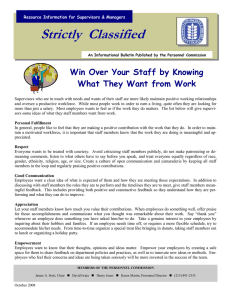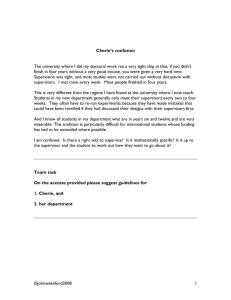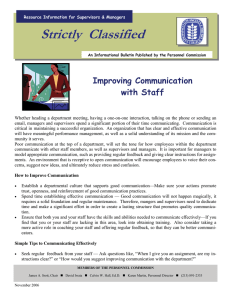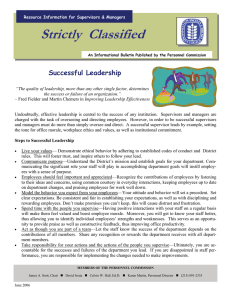Proceedings of Annual South Africa Business Research Conference
advertisement
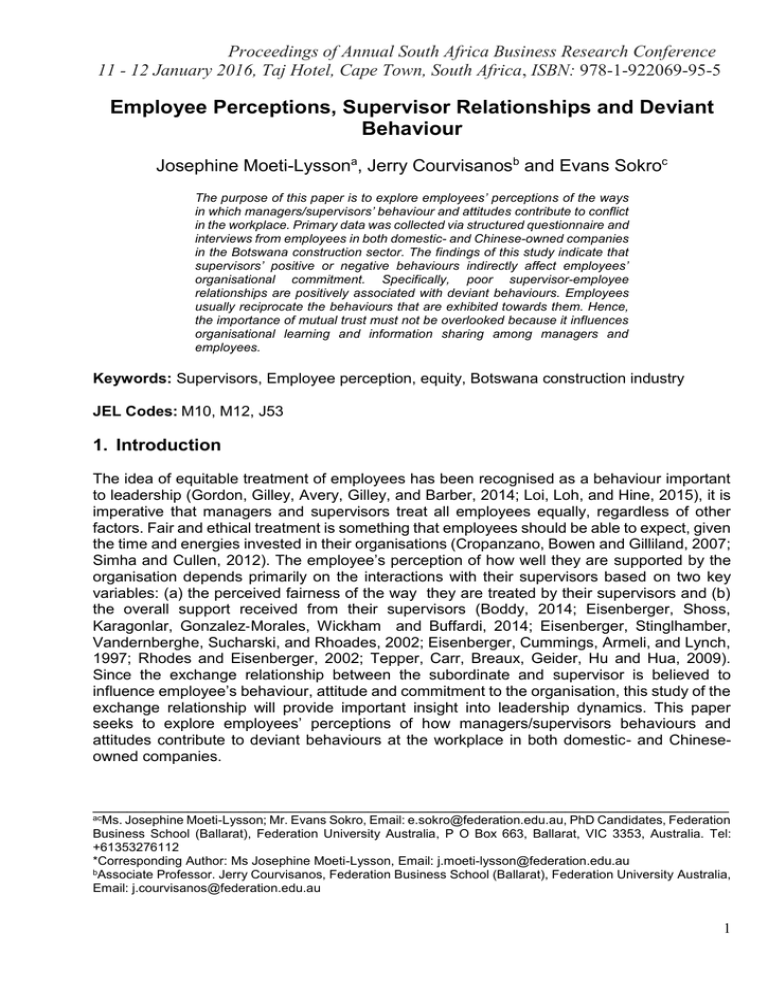
Proceedings of Annual South Africa Business Research Conference 11 - 12 January 2016, Taj Hotel, Cape Town, South Africa, ISBN: 978-1-922069-95-5 Employee Perceptions, Supervisor Relationships and Deviant Behaviour Josephine Moeti-Lyssona, Jerry Courvisanosb and Evans Sokroc The purpose of this paper is to explore employees’ perceptions of the ways in which managers/supervisors’ behaviour and attitudes contribute to conflict in the workplace. Primary data was collected via structured questionnaire and interviews from employees in both domestic- and Chinese-owned companies in the Botswana construction sector. The findings of this study indicate that supervisors’ positive or negative behaviours indirectly affect employees’ organisational commitment. Specifically, poor supervisor-employee relationships are positively associated with deviant behaviours. Employees usually reciprocate the behaviours that are exhibited towards them. Hence, the importance of mutual trust must not be overlooked because it influences organisational learning and information sharing among managers and employees. Keywords: Supervisors, Employee perception, equity, Botswana construction industry JEL Codes: M10, M12, J53 1. Introduction The idea of equitable treatment of employees has been recognised as a behaviour important to leadership (Gordon, Gilley, Avery, Gilley, and Barber, 2014; Loi, Loh, and Hine, 2015), it is imperative that managers and supervisors treat all employees equally, regardless of other factors. Fair and ethical treatment is something that employees should be able to expect, given the time and energies invested in their organisations (Cropanzano, Bowen and Gilliland, 2007; Simha and Cullen, 2012). The employee’s perception of how well they are supported by the organisation depends primarily on the interactions with their supervisors based on two key variables: (a) the perceived fairness of the way they are treated by their supervisors and (b) the overall support received from their supervisors (Boddy, 2014; Eisenberger, Shoss, Karagonlar, Gonzalez‐Morales, Wickham and Buffardi, 2014; Eisenberger, Stinglhamber, Vandernberghe, Sucharski, and Rhoades, 2002; Eisenberger, Cummings, Armeli, and Lynch, 1997; Rhodes and Eisenberger, 2002; Tepper, Carr, Breaux, Geider, Hu and Hua, 2009). Since the exchange relationship between the subordinate and supervisor is believed to influence employee’s behaviour, attitude and commitment to the organisation, this study of the exchange relationship will provide important insight into leadership dynamics. This paper seeks to explore employees’ perceptions of how managers/supervisors behaviours and attitudes contribute to deviant behaviours at the workplace in both domestic- and Chineseowned companies. __________________________________________________________________________ acMs. Josephine Moeti-Lysson; Mr. Evans Sokro, Email: e.sokro@federation.edu.au, PhD Candidates, Federation Business School (Ballarat), Federation University Australia, P O Box 663, Ballarat, VIC 3353, Australia. Tel: +61353276112 *Corresponding Author: Ms Josephine Moeti-Lysson, Email: j.moeti-lysson@federation.edu.au bAssociate Professor. Jerry Courvisanos, Federation Business School (Ballarat), Federation University Australia, Email: j.courvisanos@federation.edu.au 1 Proceedings of Annual South Africa Business Research Conference 11 - 12 January 2016, Taj Hotel, Cape Town, South Africa, ISBN: 978-1-922069-95-5 2. Literature Review In view of social exchange explanations based on the norm of reciprocity, Eisenberger et al. (2014) maintain that employees receiving favourable treatment from the organisation and its agents reciprocate with high commitment and effort. These researchers argue that when subordinates are treated favourably by their supervisors they reciprocate by working harder and providing more assistance to supervisors, resulting in high-quality leader-member exchange relationships. Leadership is often viewed as a social phenomenon based on interactive relationships between leader and followers (Harris, Kacmar and Zivnuska, 2007). According to Burton, Mitchell and Lee (2005) organisational climate is influenced by the leaders’ attitudes in the workplace. Researchers suggest that subordinates may emotionally cope with perceived hostile climates and abusive supervision by venting their negative emotions through deviant actions that harm their organisations (e.g., stealing from the organisation) or deviant behaviours that allow them to avoid their supervisors or their work situation (e.g., taking long breaks, coming to work late (Mawritz, Dust and Resick, 2014; Thau, Bennett, Mitchell and Marrs, 2009). When employees have made extra efforts or overcome obstacles to reach objectives, they expect and want some acknowledgement of these efforts from management (Garcia, Wang, Lu, Kiazad and Restubog, 2015). Greenberg (1997) argues that naturally honest employees can be pushed to behave inappropriately if they perceive their work environment as unjust, or if they feel that management has treated them unfairly. As such, managers can sometimes create an environment in which they unknowingly contribute to their employees’ deviant acts (Greenberg and Barling, 1999; Tepper et al., 2009). Skarlicki and Folger (1997) and Wei and Si (2013) argue that if organisational decisions and managerial actions are deemed to be unfair or unjust, the employees who are affected will experience feelings of anger, outrage and resentment, and these feelings may result in counterproductive employee behaviour like theft. In contrast, if organisations are perceived as just, fair and supportive there are fewer employee absences and incidents of tardiness, less employee theft and less workplace violence (Andersen, 2005; Jones, 2009; Otaye and Wong, 2014). Therefore, Buttner and Lowe (2015) and Storms and Spector (1987) suggest that it is important to take into consideration these justice-perceptions seriously, as it has been shown to affect employee trust, a foundation of effective management-employee relationships. 3. Methodology This study adopts a mixed methods approach to explore employees’ perceptions of the relationships established with them by managers and supervisors in the Botswana construction industry. In this research, a survey was conducted with a large sample to provide a broad overview of employees’ perceptions of how supervisors’ attitude and behaviours contribute to employees’ engagement in deviant behaviour. In addition, in-depth interviews were conducted to provide detailed information through interacting with employees (Creswell, 2013; Bryman and Bell, 2015). The proxies used in the questionnaire were developed from the literature and a pilot study was conducted in order to ascertain the validity of the questions. Data was collected from eight companies, but due to confidentiality they are referred to as domestic-owned and Chinese-owned companies. The ‘random sampling’ method was used which implies that each member of the population has an equal chance of being included in 2 Proceedings of Annual South Africa Business Research Conference 11 - 12 January 2016, Taj Hotel, Cape Town, South Africa, ISBN: 978-1-922069-95-5 the sample (Creswell, 2013). A total of 800 questionnaires were distributed out of which 690 were returned. Of these however, 617 questionnaires were found to be usable as all questions had been answered hence the response rate of 77%. This response rate compared favourably to those reported in other relevant studies in Botswana (e.g. Pansiri and Temtime, 2008, 88%; Phatshwane, Mapharing and Basuhi, 2014, 92%). The quantitative data was analysed using SPSS (version 21.0) for inferential statistical analysis, t-test and descriptive statistics. 3 Proceedings of Annual South Africa Business Research Conference 11 - 12 January 2016, Taj Hotel, Cape Town, South Africa, ISBN: 978-1-922069-95-5 4. Findings and Discussions Table 1- Responses on Manager/supervisor-employee relationship statements in both companies Domestic-owned companies Chinese-owned companies Mean Strongly agree Agree Neutral Disagree Strongly Disagree Mean Strongly agree Agree Neutral Disagree Strongly Disagree Management behaviour and attitudes is the main cause of dispute 3.90 31 42 15 10 2 4.01 30 51 9 7 3 Employees complaints taken seriously 2.57 6 23 14 35 22 2.42 7 13 14 45 21 Due consideration is given to employees’ complaints 2.62 5 20 24 35 16 2.47 2 17 24 40 17 Employees are all treated equally 2.38 5 15 16 40 24 2.28 2 11 23 40 24 Management often act out of self-interest 3.74 30 35 20 11 4 3.91 26 51 13 7 3 Supervisors inform you in time about changes in work 2.84 5 35 11 35 14 2.77 12 28 6 34 20 Supervisors give an explanation if something turns out wrong in your job’ 2.80 7 26 17 38 11 2.81 9 27 14 37 13 Supervisors treat you in a respectful way 2.78 6 32 15 28 19 2.37 8 12 15 40 25 Supervisors show that you are valuable to the company 2.63 5 23 20 32 20 2.32 3 15 21 33 28 Supervisors communicate in an honest and straight-forward manner 2.74 6 24 27 24 19 2.47 2 16 24 43 15 Respondents were asked to rate the statement on a Likert scale of 5 (agree) to 1 (strongly disagree). Table 2- t-test results; Manager/supervisor-employee relationship statements and demographic characteristics Demographic Characteristic s Sex Manager-employee relationship statements Management behaviour main cause of dispute Mean T 3.94 3.95 Ownership 3.90 4.01 -.120 -1.332* Employees complaints are taken seriously Mean T 2.51 2.50 2.57 2.42 .132 1.592 Due consideration is given to employees' view points Mean 2.52 2.60 2.62 2.47 T -.835 1.757 Employees are all treated equally Mean T 2.31 2.38 2.38 2.28 -.677 1.112 Management act out of self interest Mean T 3.80 3.85 3.74 3.91 -.559 -2.077* 4 Proceedings of Annual South Africa Business Research Conference 11 - 12 January 2016, Taj Hotel, Cape Town, South Africa, ISBN: 978-1-922069-95-5 Supervisor-employee relationship statements Demographic Characteristic s Supervisors inform you on time about changes in work Mean Sex T 2.76 Supervisors give good explanation if something turns out wrong in your job Mean 2.73 -1.194 2.89 Ownership T Supervisors show that you are valuable to the company Mean 2.76 Supervisors communicate in an honest and straight-forward manner Mean -.912 2.67 2.63 4.074* 2.74 3.265* 2.32 T 2.58 -1.465 2.58 2.78 2.37 T 2.44 -2.448* -.143 2.81 T 2.51 2.80 .623 2.77 Mean -2.050* 2.93 2.83 Supervisors treat you in a respectful way 3.031* 2.47 Note: (*) means there is significance; p < .05 5 Proceedings of Annual South Africa Business Research Conference 11 - 12 January 2016, Taj Hotel, Cape Town, South Africa, ISBN: 978-1922069-95-5 Table 1 demonstrates that 83% of respondents in domestic-owned companies and 64% in Chinese-owned companies are of the view that management behaviour and attitude is the cause of conflict. Also based on the T-test results shown in Table 2, there are statistically significant differences between domestic-owned and Chineseowned companies. In addition to the survey results, nine respondents who participated in the interviews who have either worked or still work in Chinese-owned companies, are of the view that foreign managers do not treat them in a dignified manner. They report verbally abusive behaviour from managers and complain about managers who often fail to show respect toward employees’ work as well as their personal needs. For most of them, their job has become necessary only in order to survive (survival necessity); they have no joy or pride in what they do. Overall employee perception is illustrated by the following quotation from R7 who works in a domestic-owned company, and R12, who works in a Chinese-owned company: I am almost proud of myself because I have endured the torture. I am tired of their version of reality. It is hard to say who is right. Money does not motivate me; I am looking for respect and status….for someone to acknowledge my opinion. Employees need their jobs, so they shut up and do as they are told. The opinion is representative of an employee view that organisations do not treat them fairly and respectfully. As a result, employees are less convinced that such organisations are concerned with employees’ interests in their decision-making or in matters concerning their general well-being. Hence this finding indicates that the general view is that employees perceive that there is a negative relationship between them and supervisors. Table 1 shows that 65% of employees in domestic-owned companies and 77% of employees from Chinese-owned companies are of the view that management acts out of self-interest and that this is one of the causes of conflict; and Table 2 indicates that there are statistically significant differences between these two types of companies. The qualitative results suggest that respondents from Chinese-owned companies are of the view that management acts out of self-interest, leading to conflict. For instance, most of the respondents expressed views similar to one shared by R9 who works in a Chinese-owned company Some supervisors know everything that’s going on, because they are local, they understand our language and listen to what people say. But they only tell the owners what they think will not jeopardize their own jobs. This finding is consistent with studies that suggest that most of the foreign companies operating in Africa are driven only by profit-making motives (Akorsu and Cooke, 2011; Baah and Jauch, 2009; Tang, 2010). Also, the present study’s findings are consistent with findings of Engelhard and Nägele (2003) who note that local employees view foreign companies as being interested in pursuing personal interests and as being consciously neglectful of employee development. Also, Dzimbiri (2010) and Van Brach (2012) note that Africans or Batswana in this case are collectivists by nature and therefore value group effort and success; they want to feel part of the organisation. 6 Proceedings of Annual South Africa Business Research Conference 11 - 12 January 2016, Taj Hotel, Cape Town, South Africa, ISBN: 978-1922069-95-5 Failure to appreciate this aspect of Botswana culture, and so fail to value the employees’ views and contributions in the decision-making process, can lead to employees perceiving the employer as being inconsiderate and disrespectful. In relation to employees’ perception of supervisors’ behaviours and attitudes as a cause of deviant behaviours, the results indicate that there are statistically significant differences between domestic- and Chinese-owned companies. Table 1 illustrates that in domestic-owned and Chinese-owned companies 47% and 65% respectively of respondents perceive that supervisors do not treat employees in a respectful way. This common finding in both types of companies that participated in this study strongly suggests that supervisors’ positive or negative behaviours indirectly affect employees’ organisational commitment (Eschleman, Bowling, Michel and Burns, 2014; Fida, Paciello, Tramontano, Fontaine, Barbaranelli and Farnese, 2014; Mitchell and Ambrose, 2007). Accordingly, the findings of this study are consistent with an assumption of social exchange theory: that subordinates perceive the supervisors as an organisational agent and therefore hold the organisation as well as the supervisors responsible for many of the supervisor’s actions (Eisenberger et al., 1997; Eisenberger et al., 2002; Kickul, 2001). Moreover, the result is consistent with the findings of Eisenberger, et al. (2014), Eschleman et al. (2014) and Gordon et al. (2014) who argue that if there are good relationships between employees and supervisors, there will be significant positive effects as these reduce negative behaviours that could harm the organisations concerned. The present study’s findings indicate that employees who feel they are not treated fairly will not be satisfied with their job (Miarkolaei,2014). In addition, if employees feel they are not being treated with dignity and respect they have less loyalty to the company and are more likely to seek retaliation. For instance most of the interviewees echoed the views expressed by R8 who works for a Chinese-owned company: I don’t like it, because they disrespect me as a person. They disrespect my knowledge. They disrespect everything. They don’t realise that as a human being need to be treated with respect. The above view demonstrates that when employees perceive that the employer cares only about self-interest or does not value them they soon come to the point where they do not see any good coming from their employers. This finding is consistent with the Otaye and Wong (2014) that employees who perceive or experience unfairness at work are less likely to advocate positively for the employers; hence this reveals that fair treatment has an important effect on employee attitudes, such as satisfaction, absenteeism and commitment. The findings therefore demonstrate reveal perceptions of fairness are crucial for both employees and organisations, because if employees perceive some form of unfairness, they are more likely to engage in deviant behaviours as a way of levelling the play field and balance out the inequity experienced. The perception held by employees that supervisors are not being honest with them means that there is no trust between the two parties which negatively affects their relationship. This finding strengthens the argument presented by other scholars such 7 Proceedings of Annual South Africa Business Research Conference 11 - 12 January 2016, Taj Hotel, Cape Town, South Africa, ISBN: 978-1922069-95-5 as (Boddy, 2014; Eschleman et al., 2014; Jones, 2009; Skarlicki and Folger, 1997; Wei and Si, 2013) that poor supervisor-employee relationship was strongly associated with deviant behaviours. This finding is significant as it reveals the link between employees’ reactions (perceived unfairness) and retribution behaviours (engaging in counterproductive behaviours) when supervisor/managers unfair treatment is perceived (Gordon et al., 2014; Mackey, Frieder, Perrewé, Gallagher, and Brymer, 2014; Reynolds, Shoss and Jundt, 2015). The finding in this study, also demonstrate that those employees who engage in deviant behaviours perceived the treatment they received to be unfair and unjust. This is consistent with Duffy, Ganster and Pagon’s (2002) findings that employees who feel undermined by their supervisors are more likely to engage in both passive and active deviant behaviours targeted towards the organisation in general. Similarly, Boddy (2014) indicates that conflict and supervisor bullying are significantly correlated with counterproductive work behaviours. It is also evident from this present study that employees may participate in co-worker-directed deviancy because the use of deviant behaviours aimed directly at the perpetrating supervisors might sometimes be risky given that such behaviour could result in an escalation of mistreatment (Mawritz et al., 2014; Mackey et al., 2014; Wei and Si, 2013). The findings of this study reveal that participants do not think their organisations provide the necessary or appropriate support, and perceive managers’ attempts at two-way communication as being insufficient to make things right. This supports previous studies that employees are concerned with organisational behaviour towards them, and communication alone is unable to sustain the quality employee-organisation relationship if that communication is not supported by effective and fair management behaviour (Otaye and Wong, 2014; Shoss, Jundt, Kobler and Reynolds, 2015). Garcia et al. (2015) find that subordinates engage in workplace deviance as a form of retaliation that serves to express frustrations and to gain retribution for abusive supervision (Colquitt, Scott, and LePine, 2007). Furthermore, this finding is also consistent with research showing that those companies that treated their employees favourably obtained favourable outcomes (Gordon et al., 2014; Tepper, et al., 2009; Wang, Liu, Luo, Ma and Liu, 2014). Litzky, Eddleston and Kidder (2006) and Krot and Lewicka (2012) emphasise that if managers create an ethical climate, treat their employees with trust and respect and adopt fair workplace rules and policies concerning rewards and punishments, then there is a reduction in the occurrence of deviant behaviours. Therefore, based on the findings, it can concluded that leadership (by both supervisors and managers) plays a part in the deviance behaviours that take place in organisations. An understanding of the needs and wants of employees, as well as a better understanding of the impact of their own managerial practices can help managers and supervisors to in improve the overall productivity of the workforce. Employees seek value-exchange from their employers, and it is the responsibility of the latter to ensure that the services it provides are delivered in a way that ensures employees will perceive that fairness and equity exist. Subsequently, both employees and employers are satisfied as they will feel their investment (of both time and money) has been honoured (Burton et.al., 2005; Lian, Ferris, Morrison, and Brown, 2014). As has been found in previous research: in organisations where employees perceived their bosses as fair, caring and supportive, 8 Proceedings of Annual South Africa Business Research Conference 11 - 12 January 2016, Taj Hotel, Cape Town, South Africa, ISBN: 978-1922069-95-5 there are reduced incidents of workplace deviant behaviours (Gordon et al., 2014; Lian et al., 2014; Loi et al., 2015). Also the findings of this current study lend a supporting argument to Mitchell and Ambrose (2007) who view deviant behaviour as a “negative reciprocity orientation” where an individual return a negative treatment with a negative treatment – ‘an eye for eye’ reciprocity. Abou-Moghli (2015) and Bell and Martin (2012) recommend that organisations should nurture a work environment that emphasises an upward communication so that employees will feel involved; self-work and self-esteem are boosted, and the incidence of workplace deviance is reduced. It would also be ideal if companies were to provide forums for employees to have a voice, since the current findings demonstrate that not all companies make it possible for employees to interact and share their views with managers. Findings from this study indicate that it does not matter if employees feedback is not implemented; instead, managers will be perceived as acting more equitably simply because the employees feel they have had the opportunity to voice their opinions and have been given audience (Qin, Ren, Zhang and Johnson, 2015). 5.Conclusion Comments The present study’s findings suggest that management’s interaction with employees is too often perceived as being shallow and unhelpful, as these interactions do not appear to address issues that concern employees. For instance, employees do not perceive that management’s communication attempts lead to positive relationship outcomes or actual changes in the organisation. A general finding across the sample surveyed is that supervisors’ attitudes and behaviours is associated with such employees deviant behaviours as making less effort on the job, working slowly, breaking machinery or deliberately doing their job incorrectly. This finding is congruent with equity theory and past research which emphasizes the human motivation to achieve fairness in exchange (Adams, 1963, 1965). This study contributes to the understanding of employment relations and deviant workplace behaviours. There are few studies with this specific interest in the Botswana context and, to the best of the researcher’s knowledge; no published studies have focused specifically on construction companies which include both domestic-owned and Chinese-owned. Previous studies have demonstrated that if employees perceive unfairness or any work related ill-treatment they are likely to engage in deviant workplace behaviour to try to ‘balance out’ the perceived unfairness. The findings of this paper not only confirm those conclusions, but also demonstrate that in both types of companies, and more especially the Chinese-owned companies, the employees are of the view that since the ill-treatment from managers and supervisors is very noticeable, there are higher incidents of deviant workplace behaviour. 9 Proceedings of Annual South Africa Business Research Conference 11 - 12 January 2016, Taj Hotel, Cape Town, South Africa, ISBN: 978-1922069-95-5 Policy Implication As a result of the findings of this study, it is recommended that when governments do business with construction companies or firms in general, their responsibilities should extend beyond the narrowly commercial concerns so as to include a wide range of social and industrial relations issues. Governments should take concerted action to regulate and manage the country’s growing foreign investment, especially the Chinese presence, by strengthening the enforcement of and adherence to laws and regulations governing immigration, labour practices and investment policies. The findings of this study indicate that employees in Chinese-owned companies perceive that some areas of conflict arise from a lack of mutual cultural understanding – for instance, language barriers have been indicated as a problem which often leads to poor communication between supervisors and employees, which can in turn lead to misunderstandings of each other’s intentions. Based on this finding it is proposed that foreign managers should, among other things, be bound by government regulation to enrol in short-term workshops or courses that include an introduction to local and national culture, including aspects of history, language and customs. This will facilitate that cultural adaptation, integration, sensitivity and respect so necessary for the development of positive relationships which are themselves the basis for sound and productive industrial relations practices. 6.References Abou-Moghli, A., 2015. The role of organisational support in improving employees performance. International Business Research, 8(2), pp. 198-203. Adams, J., 1963. Towards an understanding of inequity. The Journal of Abnormal and Social Psychology, 67(5), pp. 422-436. Adams, J., 1965. Inequity in social exchange. In: Advances in experimental social psychology. San Diego,CA: Academic Press, p. 267–299. Akorsu, A. and Cooke, F., 2011. Labour standards application among Chinese and Indian firms in Ghana: Typical or atypical?. The International Journal of Human Resource Management, 22(13), pp. 2730-2748. Andersen, J., 2005. Trust in managers: A study of why Swedish subordinates trust their managers. Business Ethics: A European Review, 14(4), pp. 392-404. Baah, A. and Jauch, H., 2009. Chinese investments in Africa: A labour perspective. Accra: African Labour Research Network. Bell, R. and Martin, J., 2012. The relevance of scientific management and equity theory in everyday managerial communication situations. Journal of Management Policy and Practice, 13(3), pp. 106-115. Boddy, C., 2014. Corporate psychopaths, conflict, employee affective well-being and counterproductive work behaviour. Journal of Business Ethics, 121(1), pp. 107121. Bryman, A. and Bell, E., 2015. Business research methods. UK: Oxford University Press.. 10 Proceedings of Annual South Africa Business Research Conference 11 - 12 January 2016, Taj Hotel, Cape Town, South Africa, ISBN: 978-1922069-95-5 Burton, J., Mitchell, T. and Lee, T., 2005. The role of self-esteem and social influences in aggressive reactions to interactional injustice. Journal of Business and Psychology, 20(1), pp. 131-170. Creswell, J., 2013. Research design: Qualitative, quantitative, and mixed methods approaches. UK: Sage. Colquitt, J., Scott, B., and LePine, J. 2007. Trust, trustworthiness, and trust propensity: A meta-analytic test of their unique relationships with risk taking and job performance. Journal of Applied Psychology, 92(4), 909-927. Cropanzano, R., Bowen, D. and Gilliland, S., 2007. The management of organisational justice. Academy of Management Perspective, 21(4), pp. 34-48. Duffy, M., Ganster, D., and Pagon, M. 2002. Social undermining in the workplace. Academy of Management Journal, 45(2), 331-351. Dzimbiri, L. 2010. Indigenous and modern disputes resolution procedures: A comparative analysis of the Lomwe and workplace disputes resolution procedures in Malawi. Indigenous methods of conflict resolution in Africa (pp. 5265). Gaborone: Centre for Culture and Peace Studies. Eisenberger, R., Cummings, J., Armeli, S. and Lynch, P., 1997. Perceived organisational support, discretionary treatment and job satisfaction. Journal of Applied Psychology, 82(5), pp. 812-820. Eisenberger, R., Shoss, M., Karagonlar, G., Gonzalez‐Morales, M., Wickham, R., and Buffardi, L., 2014. The supervisor POS–LMX–subordinate POS chain: Moderation by reciprocation wariness and supervisor's organisational embodiment. Journal of Organisational Behavior, 35(5), pp. 635-656. Eisenberger, R., Stinglhamber, F., Vandernberghe, C., Sucharski, I., and Rhoades, L., 2002. Perceived supervisor support: Contributions to perceived organisational support and employee retention. Journal of Applied Psychology, 87(3), pp. 565573. Eschleman, K., Bowling, N., Michel, J. and Burns, G., 2014. Perceived intent of supervisor as a moderator of the relationships between abusive supervision and counterproductive work behaviours. Work and Stress: An International Journal of Work,Health and Organisations, 28(4), pp. 362-375. Fida, R., Paciello, M., Tramontano, C., Fontaine, R., Barbaranelli, C., and Farnese, M., 2014. An integrative approach to understanding counterproductive work behaviour: The roles of stressors, negative emotions, and moral disengagement.. Journal of Business Ethics, pp. 1-14. Garcia, P., Wang, L., Lu, V., Kiazad, K., and Restubog, S., 2015. When victims become culprits: The role of subordinates’ neuroticism in the relationship between abusive supervision and workplace deviance. Personality and Individual Differences, Volume 72, pp. 225-229. Gordon, G., Gilley, A., Avery, S., Gilley, J., and Barber, A., 2014. Employee perceptions of the manager behaviors that create follower-leader trust. Management and Organisational Studies, 1(2), pp. 44-58. Greenberg, J., 1997. The steal motive: Managing the social determinants of employee theft.. In: Antisocial behavior in organisations.. Thousand Oaks,CA: Sage, pp. 85-108. Greenberg, L. and Barling, J., 1999. Predicting employee aggression against coworkers, subordinates and supervisors: The roles of person behaviours and 11 Proceedings of Annual South Africa Business Research Conference 11 - 12 January 2016, Taj Hotel, Cape Town, South Africa, ISBN: 978-1922069-95-5 perceived workplace factors. Journal of Organisational Behaviour, Volume 20, pp. 897-913. Harris, K., Kacmar, K. and Zivnuska, S., 2007. An investigation of abusive supervision as a predictor of performance and the meaning of work as a moderator of the relationship. The Leadership Quarterly, 18(3), pp. 252-263. Jones, D., 2009. Getting even with one's supervisor and one's organisation: Relationships among types of injustice, desires for revenge, and counterproductive work behaviours. Journal of Organisational Behaviour, 30(4), pp. 525-542. Kickul, J., 2001. When organisations break their promises: Employee reactions to unfair processes and treatment. Journal of Business Ethics, 29(4), pp. 289-307. Krot, K. and Lewicka, D., 2012. The importance of trust in manager-employee relationships. International Journal of Electronic Business Management, 10(3), pp. 224-233. Lian, H., Ferris, D., Morrison, R. and Brown, D., 2014. Blame it on the supervisor or the subordinate? Reciprocal relations between abusive supervision and organisational deviance. Journal of Applied Psychology, 99(4), pp. 651-664. Litzky, B., Eddleston, K. and Kidder, D., 2006. The good, the bad, and the misguided: How managers inadvertently encourage deviant behaviours. The Academy of Management Perspectives, 20(1), pp. 91-103. Loi, N., Loh, J. and Hine, D., 2015. Don’t rock the boat: the moderating role of gender in the relationship between workplace incivility and work withdrawal. Journal of Management Development, 34(2), pp. 169-186. Mackey, J., Frieder, R., Perrewé, P., Gallagher, V., and Brymer, R., 2014. Empowered employees as social deviants: The role of abusive supervision. Journal of Business and Psychology, 30(1), pp. 149-162. Mawritz, M., Dust, S. and Resick, C., 2014. Hostile climate, abusive supervision, and employee coping: Does conscientiousness matter?. Journal of Applied Psychology, 99(4), pp. 737-747. Miarkolaei, H., 2014. An investigation on relationship between employees’ job satisfaction and organisational commitment. Management Science Letters, 4(4), pp. 669-678. Mitchell, M. and Ambrose, M., 2007. Abusive supervision and workplace deviance and the moderating effects of negative reciprocity beliefs. Journal of Applied Psychology, 92(4), pp. 1159-1168. Otaye, L. and Wong, W., 2014. Mapping the contours of fairness: The impact of unfairness and leadership (in) action on job satisfaction, turnover intention and employer advocacy. Journal of Organisational Effectiveness: People and Performance, 1(2), pp. 191-204. Phatshwane, P., Mapharing, M. and Basuhi, E., 2014. Attitudes towards business ethics held by accountancy and finance students in the University of Botswana. International Journal of Business and Management, 9(2), pp. 17-29. Qin, X., Ren, R., Zhang, Z. and Johnson, R., 2015. Fairness heuristics and substitutability effects: Inferring the fairness of outcomes, procedures, and interpersonal treatment when employees lack clear information. Journal of Applied Psychology, 100(3), pp. 749-766. 12 Proceedings of Annual South Africa Business Research Conference 11 - 12 January 2016, Taj Hotel, Cape Town, South Africa, ISBN: 978-1922069-95-5 Reynolds, C., Shoss, M. and Jundt, D., 2015. In the Eye of the beholder: a multistakeholder perspective of organisational citizenship and counterproductive work behaviors. Human Resource Management Review, 25(1), pp. 80-93. Shoss, M. K., Jundt, D., Kobler, A., and Reynolds, C. (2015). Doing bad to feel better? An investigation of within-and between-person perceptions of counterproductive work behavior as a coping tactic . Journal of Business Ethics, 1-17. Simha, A. and Cullen, J., 2012. Ethical climates and their effects on organisational outcomes-implications from the past, and prophecies for the future. Academy of Management Perspectives, 26(4), pp. 20-34. Skarlicki, D. and Folger, R., 1997. Retaliation in the workplace: The roles of distributive, procedural, and interactional justice. Journal of applied Psychology, 82(3), pp. 434-443. Tang, X., 2010. Bulldozer or locomotive? The impact of Chinese Enterprises on the local employment in Angola and the DRC. Journal of Asian and African Studies, 45(3), pp. 350-368. Tepper, B., Carr, J., Breaux, D., Geider, S., Hu, C., and Hua, W., 2009. Abusive supervision, intentions to quit, and employees’ workplace deviance:A power/dependence analysis. Organisational Behavior and Human Decision Processes, 109(2), pp. 156-167. Thau, S., Bennett, R., Mitchell, M. and Marrs, M., 2009. How management style moderates the relationship between abusive supervision and workplace deviance: An uncertainty management theory perspective. Organisational Behaviour and Human Decision Processes, 108(1), pp. 79-92. Van Bracht, G., 2012. A survey of Zambian views on Chinese People and their involvement in Zambia. African East-Asian Affairs, Volume 1, pp. 54-97. Wang, H., Liu, X., Luo, H., Ma.B, and Liu, S. (2014). Linking procedural justice with employees work outcomes in China: The mediating role of job security. Social Indicators Research, 1-12. Wei, F. and Si, S., 2013. Abusive supervision and counterproductive work behaviors: The moderating effects of locus of control and perceived mobility.. Asia Pacific Journal of Management, 30(1), pp. 281-296. 13

